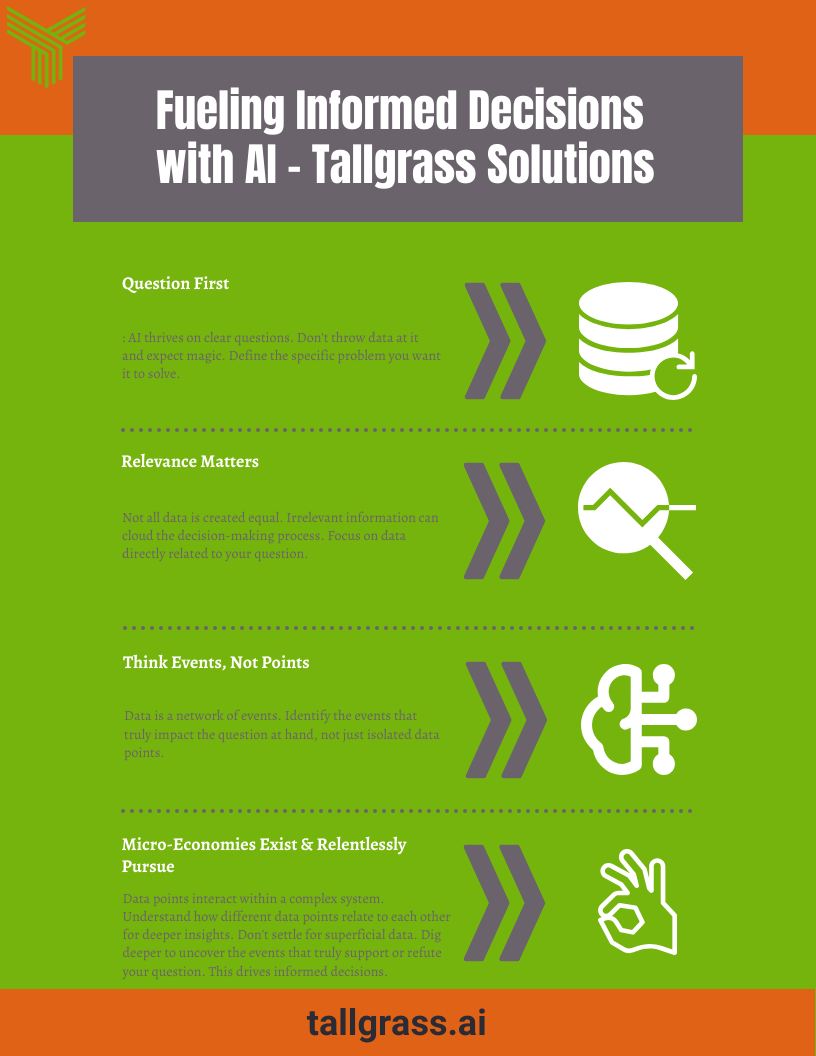Fueling Informed Decisions
- by Tallgrass
- May 2, 2024
The power of AI lies in its ability to analyze vast amounts of data, uncover patterns, and make informed decisions. But like the old adage goes, “garbage in, garbage out.” The quality and relevance of data fed to AI systems are paramount to their success.
1) Understanding the Question is Key
While data is the lifeblood of AI systems, simply having a vast amount of it isn’t enough. Just like a human wouldn’t attempt to solve a complex equation without first understanding the problem, an AI system requires a clear understanding of the specific question it’s trying to answer.
Imagine feeding an AI system a massive dataset of historical weather patterns and asking it to predict the stock market. While the weather data might contain valuable information, it’s ultimately irrelevant to the question at hand. This is because not all data is created equal. Irrelevant information can cloud the decision-making process and lead to inaccurate or misleading outcomes, even if plentiful.
Think of it like searching for a specific book in a library. If you wander the aisles without any direction, you’ll likely get lost in the sheer volume of information. However, you can efficiently locate the relevant information by clearly defining your objective (finding a specific book) and utilizing the library’s search tools and organizational system.
Similarly, an AI/ML/LLM needs a clear understanding of the question to effectively navigate the vast ocean of data and identify the specific information required to arrive at a well-informed decision. This targeted approach ensures that the AI system focuses its analysis on the relevant data points, ultimately leading to more accurate and reliable outcomes.
Here are some specific examples from different domains:
Returns Management (RMA):
- Question: What are the primary reasons for customer product returns?
- Relevant Data: Customer feedback, product defect reports, shipping data, order history, and warranty claims.
- Irrelevant Data: Social media sentiment about the brand, competitor pricing information, or global weather patterns.
- Question: Can we predict which orders are more likely to be returned?
- Relevant Data: Order details (items purchased, quantities, customer demographics), historical return data for similar products, and any promotional offers applied.
- Irrelevant Data: Employee performance reviews, marketing campaign results for unrelated products, or competitor return policies.
Healthcare Coding:
- Question: What is the most accurate medical code for this patient’s diagnosis and treatment?
- Question: Can we identify potential cases of fraudulent coding?
By focusing on the specific question at hand and identifying the relevant data points, AI systems can be trained to make informed decisions in various domains, leading to improved efficiency, cost savings, and better outcomes.

2) Focus on Relevant Events, Not Just Data Points
Data is more than just a collection of isolated points; it’s a dynamic narrative woven from a tapestry of events. Identifying the events most relevant to the question at hand is crucial for an AI system to make accurate conclusions.
Think of it like solving a detective case. While a mountain of evidence might be available, only specific events, like the murder weapon, witness testimonies, and the suspect’s alibi, hold the key to solving the mystery. Similarly, an AI system needs to focus on the events that directly contribute to the question it’s trying to answer.
This targeted approach has several advantages:
• Reduced Noise: By filtering out irrelevant data, the AI system avoids being overwhelmed by information overload, leading to clearer and more focused analysis.
• Improved Accuracy: Focusing on relevant events allows the AI to identify the most significant patterns and relationships within the data, leading to more accurate and reliable conclusions.
• Enhanced Efficiency: By prioritizing the analysis of relevant data, the AI system can operate more efficiently, saving time and resources.
Therefore, understanding the specific question and identifying the corresponding crucial events are essential steps in empowering your AI system to make informed and accurate decisions.
Read more on AI & Micro-Economies and Relationships Matter & AI & Relentlessly Pursue the Events that Make Your Question True
